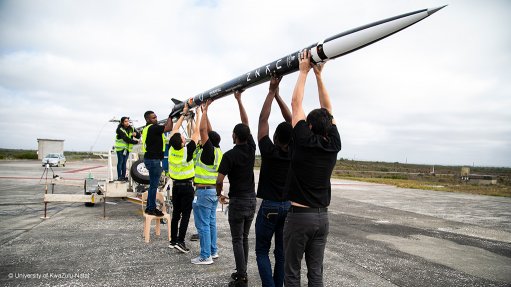
The UKZN ASRI team place the Phoenix-1D upon its launcher
Photo by: University of Kwazulu-Natal
South Africa’s Ministry of Higher Education, Science and Innovation has announced that a research group at the University of KwaZulu-Natal (UKZN) has successfully launched a suborbital demonstrator rocket from the Overberg Test Range, on the south coast of the Western Cape province.
This is the second such launch successfully executed by the group, known as the Aerospace Systems Research Institute (ASRI – previously known as the Aerospace Systems Research Group, or ASReG).
The rocket, designated Phoenix-1D, was powered by a hybrid rocket motor. Hybrid rockets used solid fuel with a liquid oxidiser and were an attempt to combine the advantages of solid fuel rockets (simplicity, reliability and the ability to store the fuel) with those of liquid-fuelled rockets (efficiency, high specific impulse production and re-ignition capability).
“I am proud of the young people driving this exciting programme at UKZN,” highlighted Higher Education, Science and Innovation Minister Dr Blade Nzimande. “They are a team of dedicated mechanical engineering students who have been working tirelessly on ensuring that the launch is successful.”
The Phoenix-1D carried a payload of experiments and cameras on its flight. It was part of a combined technology and skills development programme. The technology aspect was an integrated Space Propulsion Programme, to develop both suborbital sounding rockets, under the designation Phoenix, and a liquid rocket motor for orbital flights, designated SAFFIRE (for South African First Integrated Rocket Engine). The UKZN is currently the only South African university with an applied rocket propulsion programme.
The human skills development aspect of the programme is focused on the development of advanced engineering skills graduates. Over the past 12 years, the programme has produced such graduates, who have gone on to jobs in the country’s defence, space and science and technology sectors.
The first launch undertaken by the group, then designated ASReG, was carried out in March 2021. It involved a Phoenix-1B Mark IIr sounding rocket, which reached an altitude of 17 900 m. That was a new record for an African hybrid rocket.
The current test campaign will be concluded with a second launch, this time of a low- altitude Phoenix-1C rocket. Should the weather permit, it will carry a payload of experiments from the South African National Space Agency, the Cape Peninsula University of Technology, and a private company, which it was planned would be recovered after the flight.
It is hoped that the Phoenix technology demonstration programme gives rise to a commercial suborbital sounding rocket programme. Sounding rockets carry experimental payloads into the topmost regions of the atmosphere and into space itself.
Nzimande pointed out that the space sector was a key element in addressing the country’s national priorities of job creation, poverty eradication, resource management and rural development.